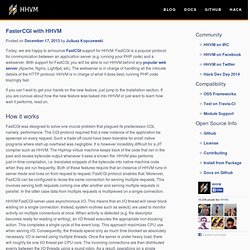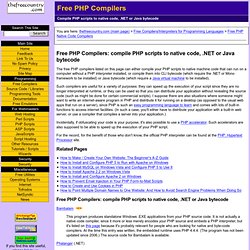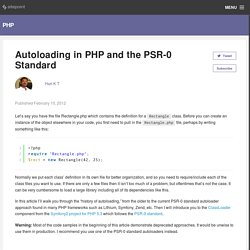

FasterCGI with HHVM « HipHop Virtual Machine. FasterCGI with HHVM Posted on December 17, 2013 by Juliusz Kopczewski Today, we are happy to announce FastCGI support for HHVM.

FastCGI is a popular protocol for communication between an application server (e.g. running your PHP code) and a webserver. With support for FastCGI, you will be able to run HHVM behind any popular web server (Apache, Nginx, Lighttpd, etc). The webserver is in charge of handling all the intricate details of the HTTP protocol. If you can’t wait to get your hands on the new feature, just jump to the Installation section. FastCGI was designed to solve one crucial problem that plagued its predecessor CGI, namely: performance. HHVM FastCGI server uses asynchronous I/O. A separate set of worker threads is used to execute PHP code. We conducted benchmarks using Nginx. WordPress The first test was performed using the WordPress example page. Free PHP Compilers: compile PHP scripts to native code, .NET or Java bytecode. The free PHP compilers listed on this page can either compile your PHP scripts to native machine code that can run on a computer without a PHP interpreter installed, or compile them into CLI bytecode (which require the .NET or Mono framework to be installed) or Java bytecode (which require a Java virtual machine to be installed).

Such compilers are useful for a variety of purposes: they can speed up the execution of your script since they are no longer interpreted at runtime, or they can be used so that you can distribute your application without revealing the source code (such as might be done for certain commercial scripts). 50 Extremely Useful PHP Tools. Advertisement By Jacob Gube PHP is one of the most widely used open-source server-side scripting languages that exist today.

With over 20 million indexed domains using PHP, including major websites like Facebook, Digg and WordPress, there are good reasons why many Web developers prefer it to other server-side scripting languages, such as Python and Ruby. PHP is faster (updated), and it is the most used scripting language in practice; it has detailed documentation, a huge community, numerous ready-to-use scripts and well-supported frameworks; and most importantly, it’s much easier to get started with PHP than with other scripting languages (Python, for example). That’s why it makes perfect sense to provide the huge community of PHP developers with an overview of useful tools and resources that can make their development process easier and more effective.
Backward Incompatible Changes. Phil Sturgeon. Made in Production Late last summer I was riding my bike around the mountains of New Jersey. I'm not sure if it was exhaustion, the heat or the fact that I had run out of podcasts to listen to but I had an idea: I should get into the t-shirt sale business. Read More » PHP-FIG: Autoloaders, Amendments and The "15th Standard"
OOP: instantiating a class twice to get double value? (coffee + two shots) [Archive] Micro PHP. Autoloading in PHP and the PSR-0 Standard. Let’s say you have the file Rectangle.php which contains the definition for a Rectangle class.

Before you can create an instance of the object elsewhere in your code, you first need to pull in the Rectangle.php file, perhaps by writing something like this: Normally we put each class’ definition in its own file for better organization, and so you need to require/include each of the class files you want to use. If there are only a few files then it isn’t too much of a problem, but oftentimes that’s not the case. It can be very cumbersome to load a large library including all of its dependencies like this. In this article I’ll walk you through the “history of autoloading,” from the older to the current PSR-0 standard autoloader approach found in many PHP frameworks such as Lithium, Symfony, Zend, etc. Warning: Most of the code samples in the beginning of this article demonstrate deprecated approaches.
FPDF. Interview - PHP's Creator, Rasmus Lerdorf. The membership of the SitePoint community forums recently got together and produced a bunch of questions for PHP’s original creator, Rasmus Lerdorf. In reviewing his responses, I was pleased to discover that the man who originally put the PHP machine in motion maintains an unclouded vision of what the open source movement is all about. He is quick to play down his contribution to what PHP is today, instead attributing most of PHP’s success to the vast community of developers that have signed on to the project over the years. In a sense, Rasmus today is simply PHP’s biggest fan. But enough from me; let’s hear what Rasmus had to say! In the beginning… SP: What was your first contact with the Open Source movement, and what is it about Open Source that got you hooked? RL: Well, back in the early and mid-90′s the term "Open Source" did not exist. "Free Software" existed, of course, and I had been playing with Linux almost since the very first release in 1991.